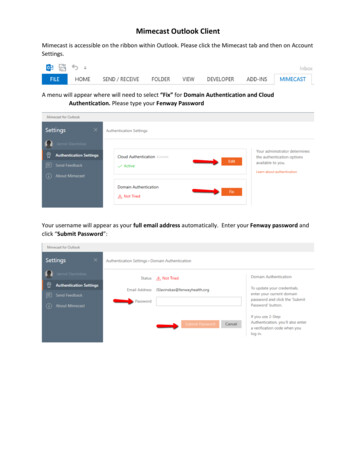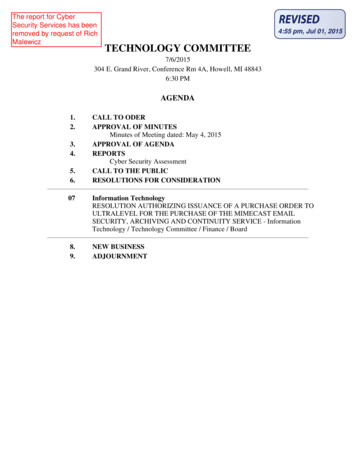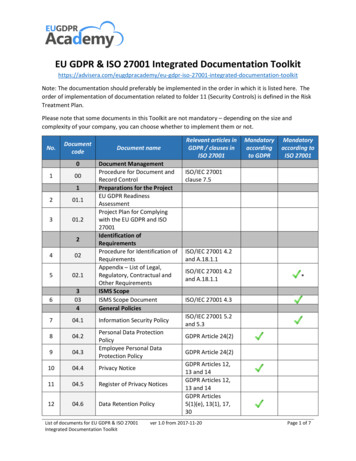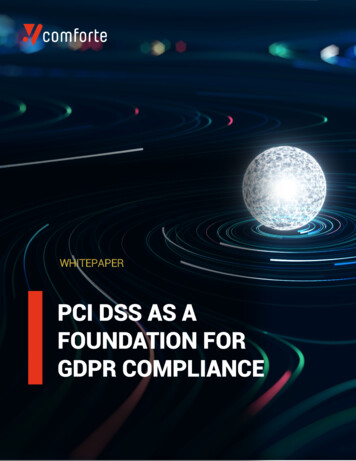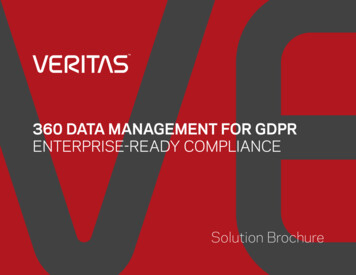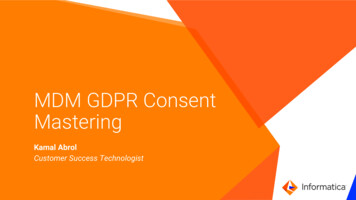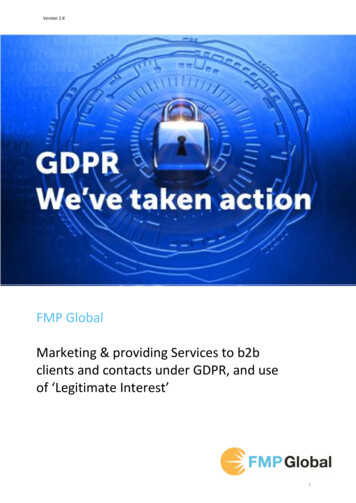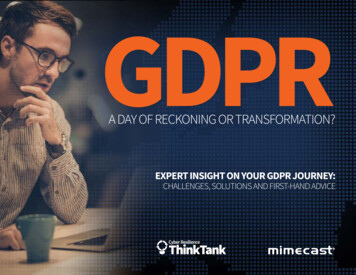
Transcription
GDPREXPERT INSIGHT ON YOUR GDPR JOURNEY:CHALLENGES, SOLUTIONS AND FIRST-HAND ADVICE
CONTENTSTHE GDPR JOURNEY: WHAT YOU NEED TO KNOW3GDPR READINESS: AN INDUSTRY OUTLOOK 7THE BOTTOM LINE 16
The GDPR Journey: What You Need to KnowData. It’s fluid, dynamic and alive within your organization.Data knows no limits when it comes to where it flows: thedepartments, devices, networks, environments and emailsystems – even third-party vendors – through which it passesseem boundless.Everyone interacts with data, and the expectation that itshould be accessible and available all the time hasalready been established. But what about control overthis data? Specifically, an individual’s personal data.What would happen if individuals gained total controlover their personal data – things like emailconversations, social security numbers, phone numbers,home addresses, HR files and more – the data that lives invirtually countless places in your environment.What if individuals had the power to request that their entirepersonal, data-related life be deleted for good?AN ORGANIZATION LIKE YOURS: MAY 25, 2018This is the day your relationship with data and privacy couldchange forever. This is the day when the European Union GeneralData Protection Regulation (GDPR) takes effect. This is the daywhen individuals do, in fact, gain control over their personal dataand how it’s used. This is the day when EU residents canrequest organizations with personal data about them tostop using it, transfer it, or ultimately, delete it.So, what is “personal data,” anyway?When it comes to personal data and GDPR requests,context matters. Gartner defines* personal data as anyinformation relating to an identified or identifiable naturalpersonal (i.e., “data subject”). Personal data can be anything fromlocation data, cookies, and employee records and numbers.Are you prepared to locate any individual’s personal data, whetherit’s living data, archived, being used in a test environment, or inother known-and unknown-places? For the majority of globalorganizations, the answer is, “Probably not.”3 GET READY TO THINK DIFFERENTLY ABOUT ARCHIVING3 GDPR: A DAY OF RECKONING OR TRANSFORMATION?*A recent Gartner report, GDPR Clarity: 19 Frequently Asked Questions Answered (29 August 2017)
The GDPR Journey: What You Need to KnowEMAIL: A HOTBED OF PERSONAL DATA.By design, email systems hold a huge amount of personal data,which includes email addresses, phone numbers and otherinformation commonly managed for marketing, customersupport and more. GDPR requires that organizations consistentlymanage backed-up and archived copies, since they arerepositories of personal data. In other words, you must be able toefficiently search, find, extract and potentially delete data in youremail system, on request.THE GLOBAL EFFECT.“My organization isn’t based in Europe – I’m off the hook (phew!).”Wrong.GDPR impacts organizations globally. If you’re a company orgovernment agency that markets, tracks or handles the personaldata of EU residents, GDPR obligations apply to you.QuickFact:According to Gartner, on May 25, 2018, less than50 percent of organizations impacted will fullycomply with GDPR.4 GDPR: A DAY OF RECKONING OR TRANSFORMATION?
The GDPR Journey: What You Need to KnowThis means you may be required to obtain explicit (opt-in) consentfrom the owners of this data at the time of its collection.Adhering to GDPR-mandated processes and capabilities will likelyrequire a massive time commitment and investment. Given theglobal scope of GDPR and its transformative impact, it’s imperativethat organizations review – and most likely overhaul – the waythey handle personal data today. This means having theappropriate technology, processes and staff in place to secure thedata and manage live and archived copies meticulously.If you’re not ready to meet these mandatory GDPR requirements,be prepared to potentially pay a massive penalty. And thebacklash doesn’t stop at fines. You will likely suffer reputationaldamage, loss of market share, and decreased investor confidence.GDPR PENALTIES: AN OPERATIONAL KILLER.If you think putting a process and plan in place for GDPR isoverwhelming, you’re right. However, brushing-off the Maydeadline can cost you. Penalties for non-compliance could costupwards of 20 million or four percent of an offendingorganization’s yearly worldwide revenue, whichever is higher.THE REPERCUSSIONS ARE REAL. ACCORDING TO THE ANNUAL FINANCIAL REPORTS OF THE FTSE 100: Some companies could see their entire annual profit wiped out if they were to facea four percent fine under GDPR. Of the 100 companies listed in the FTSE 100, 34 would see their profit wiped outwith a four percent fine.5 GDPR: A DAY OF RECKONING OR TRANSFORMATION?
WHAT’S YOUR TRUST STRATEGY?A “Trust Strategy” is made up of three things: SECURITY, PRIVACY AND TRANSPARENCY. And data is at the core of this trifecta. Without a firm grasp of the data you collect, store and use, it will be nearly impossible to instill confidence in the products and servicesyour organization provides.1CREATE A DATAGOVERNANCE PROGRAM.This should include a data classificationscheme that identifies the data yourorganization collects and processes, andranks these categories based on risk to yourorganization. Create a repeatable processthat identifies what data you collect, fromwhom, where it flows, and its final disposition– whether it’s stored, deleted or transferredto a third-party.6 GDPR: A DAY OF RECKONING OR TRANSFORMATION?2AUDIT YOUR SECURITYPROGRAM.It’s important to assess your securityprogram and ensure it’s protecting the mostimportant data assets you have identified inyour data governance program. Test yourincident response process! With GDPRrequiring as little as 72 hours to notify yourlocal regulators and partners, testing in themiddle of an incident will not be ideal.3BE TRANSPARENTWHEN YOU COLLECTAN INDIVIDUAL’S DATA.Update your internal and external privacypolicies to ensure they accurately reflecthow you protect data. And, have a process inplace to help guide customers andemployees when they have questions orconcerns, or want to update their data. Thiscould be as easy as setting up a monitoredemail inbox and a manual workflow toensures requirements are met.
GDPR Readiness: An Industry OutlookAs data privacy and data security become paramount issuesfacing organizations across the globe, you have little choicebut to implement, maintain and teach good data practices,especially as external regulations continue to take affect acrossthe globe.These regulations are far-reaching, and have the power to impactboth large-and small-economies, as well as organizations of allsizes and across all industries. But is anyone truly prepared totake on such a massive transformation? And will organizations beable to survive in the wake of these mounting regulations?Mimecast wanted to get to the root of some of the biggestconcerns, challenges and potential solutions when it comes todealing with GDPR readiness. The Cyber Resilience Think Tankgathered for a roundtable discussion where several industryinfluencers and experts dove into hot-button topics surroundingGDPR, data security and data privacy.The Cyber Resilience Think Tank is a group of select industry experts dedicatedto bringing to light common cyber resilience challenges, while providingguidance on possible solutions.7 GDPR: A DAY OF RECKONING OR TRANSFORMATION?
GDPR Readiness: An Industry OutlookREADY-OR-NOT: IT’S UP TO YOU.While there are contributing factors that will impact anorganization’s GDPR readiness – like the maturity of a company’sapproach to data management, and whether an organization is ina highly-regulated environment – making data protection anddata privacy a priority is your responsibility.Helen Rabe, Head of Cyber Defense, EMEA at CBRE said, “If datahas been treated by an organization as nothing more than ameans-to-an-end, it’s likely the duty of care toward that data willnot have been diligent enough to meet the GDPR compliancerequirements. Factor in the volume of data and the types of dataused, and this can be a large program of work to remediate.”Rabe continued, “GDPR isn’t going away. If you want to stay anactive part of the digital ecosystem, and ensure your reputationand revenue generation is in-line with these demands, you willneed to respect the notion that data regulation is key to success.”8 GET READY TO THINK DIFFERENTLY ABOUT ARCHIVING8 GDPR: A DAY OF RECKONING OR TRANSFORMATION?GDPR isn’t going away. If youwant to stay an active part of thedigital ecosystem, and ensureyour reputation and revenuegeneration is in-line with thesedemands, you will need to respectthe notion that data regulation iskey to success.”Helen RabeCISO, CBRE
GDPR Readiness: An Industry Outlook“I CAN MEET THE 72-HOUR RESPONSE TIME,”SAID NO ONE.Under GDPR regulations, organizations have a steep 72-hourwindow in which to respond to requests. Marc French, Chief TrustOfficer at Mimecast said, “Almost everyone I talk to say they are 100percent not going to make the May deadline. They are so far behind,and getting privacy talent is difficult.”Ari Schwartz, Managing Director of Cybersecurity Services at Venablesaid, “Zero percent of organizations will be ready to meet themandatory 72-hour response time. It’s very complicated forcompanies to get a handle on this, especially if they don’t have aprivacy team in place.”APPLICATIONS ARE MASSIVE DATA GATEWAYS.Chris Wysopal, CTO and Co-founder at Veracode said, “If data has tobe encrypted, made pseudonymous or masked, that means youhave to change all your applications – no one is ready to do that. Ittakes a long time to understand who is going to be accessing whatapplications and data, and deciding on a strategy for complyingaround that data.”9 GDPR: A DAY OF RECKONING OR TRANSFORMATION?
GDPR Readiness: An Industry Outlook“Even if you have one application accessing the data in one location,and you decide to encrypt that data, until you have all the applicationsthat access that data being able to decrypt it, you have to have a copyof it in the clear. When is this going to happen for the lastlegacy system?”According to Wysopal, it will take companies several years to get to thepoint where all their data is encrypted. “They still have to run theirbusiness; they still have to keep their applications to run their business.To me, this is the long haul – making sure every application still hasaccess to the data it needs to run, and that the data is secure.”Something else to consider when it comes to application security anddata: a lot of technologies take snapshots of data all the time forredundancy. “When you delete a file, you have something sitting inthe clear in your storage network,” said Wysopal. “I don’t think peoplehave any understanding of all the places where their data flows intheir business.”Evan Blair, Co-founder of ZeroFox said, “Think about when theengagement of the business ends up in the cloud, or in the socialmedia landscape. There is a whole other perimeter outside of yourcontrol where data is being shared. Where is this data being transferredfrom, where is it being shared, and who has access to it?”10 GET READY TO THINK DIFFERENTLY ABOUT ARCHIVING10 GDPR: A DAY OF RECKONING OR TRANSFORMATION?When you delete a file, you havesomething sitting in the clear inyour storage network, I don’t thinkpeople have any understandingof all the places where their dataflows in their business.”CHRIS WYSOPALCTO AND CO-FOUNDERVERACODE
GDPR Readiness: An Industry OutlookDATA GOVERNANCE IS FOUNDATIONAL.The core of privacy and security is understanding the data. GDPRreadiness is a data governance problem, and something too manyorganizations tend to skip.“You need to think about: Where is my data, is it classified, and do Iknow how to protect it?” said French. “A lot of times, we miss the datagovernance and data architecture step. Without this, it will be hard toapply security control effectively. If you don’t have the data governancefoundation, you’re going to miss a lot of stuff in the process.”for employees to collaborate and share creates a dynamic that I’m notsure anyone will ever be prepared for,” said Blair.According to Schwartz, “Just encrypting everything only solves part ofthe problem. How do you know if you’ve removed a customer’s recordfrom everywhere within your organization, unless you know whereeverything is? You need that data governance foundation.”Customer data has now madeits way to things like Slack andHipChat, and IT has it in theirtest environment – you justcan’t track it all.”Blair continued, “In this self-provisioning cloud world we live in,something like Slack can be turned on inside your organization by anyemployee and shared with an entire system. Customer data has nowmade its way to things like Slack and HipChat, and IT has it in their testenvironment – you just can’t track it all.”EVAN BLAIRCO-FOUNDER, VP WORLDWIDE CHANNELSALES, ZEROFOX“Data governance is incredibly important. But, all of these new ways11 GET READY TO THINK DIFFERENTLY ABOUT ARCHIVING11 GDPR: A DAY OF RECKONING OR TRANSFORMATION?
GDPR Readiness: An Industry OutlookFINES, FREAK-OUTS AND BULLS-EYES.Once the May deadline comes and goes, certain organizations willbecome the target for maximum fines and penalties for noncompliance – and there will likely be a short acclimation period,especially for U.S.-based companies.“Organizations are really going to start to freak-out the first time acompany gets hit with a 20 million fine,” said Schwartz. “The FederalTrade Commission brings a lot of cases; the European debt protectionagencies do not. They will start to bring a lot more cases, but it’s goingto take them time to ramp-up as an enforcement agency.”Organizations are really going to startto freak-out the first time a companygets hit with a 20 million fine.”ARI SCHWARTZMANAGING DIRECTOR OFCYBERSECURITY SERVICESVENABLE, LLC12 GDPR: A DAY OF RECKONING OR TRANSFORMATION?
GDPR Readiness: An Industry OutlookFrench continued, “U.S. companies will be a target; they will be madean example of. It probably won’t be May 2018 but it will likely be August– I bet someone will be made an example of by the end of the summer.”According to French, the U.S. companies that will be under a microscopewill be prepared to fight against non-compliance fines. “These are thebest-resourced organizations, and they have made tremendousinvestments to ensure they are not made an example of,” he said.“Where we are going to fall down a little bit is downstream – thecompanies that can’t apply the same resources. They are probablygoing to get hit the hardest.”RISK MITIGATION GOES A LONG WAY.things you work out. Do a little bit of risk management in your business,and figure out where you’re likely to get hit.”Schwartz said, “I agree that the 72-hour breach notification is going tobe a new standard. I don’t think anyone is ready for this, but it’s whatcompanies need to target.”U.S. companies will be a target;they will be made an example of.”When it comes to preparing your organization for GDPR, there are manystages of readiness, compliance and protection to consider. You mightbe wondering where to start, and you’re not alone.“As you go through your GDPR journey, you should hit the areas whereyou think it’s going to be most impactful for you – that’s where you start,”said French. “If you’re an industry where breaches are an issue, youshould figure out how to do your 72-hour response as one of the first13 GET READY TO THINK DIFFERENTLY ABOUT ARCHIVING13 GDPR: A DAY OF RECKONING OR TRANSFORMATION?MARC FRENCHCHIEF TRUST OFFICERMIMECAST
EXPERT ADVICE: PRIORITIZING GDPR HURDLES1TRANSPARENCY AND RESPONSEWhat will attract the most attention to you is when youhave a breach. The way in which you respond—smoothlyand with transparency —when you have an incident willbe important. Do this well and it will buy you time and2good-will.DATA CLASSIFICATIONCompanies accumulate large amounts of dataall over the place without thinking about what’s consideredto be “personal data” – which is expansive. Understandwhat GDPR considers to be “personal data” (remember,context matters), and find out all the places where this dataresides. Unless something has business value, get rid of it.3DATA PORTABILITYSubject Access Request enables any data subject to requestwhat personal information a company holds on them. Thismeans you must be able to deliver requested personal datain a readable, portable format.4RISK MANAGEMENTDon’t try to tackle all your data at once. First, focus on thefive or six areas you need to overcome by the deadline. Forexample: if you have a website, focus on that first; emailholds vast amounts of personal data and can be a big riskif not prioritized; if you’re tracking through social media,this should be an area of priority. If you don’t do a riskmanagement exercise, it will be hard to make progress.14 GDPR: A DAY OF RECKONING OR TRANSFORMATION?
BUILDING A GDPR DREAM TEAMFinding dedicated privacy talent is difficult, but it’s not impossible to assemble ateam within your organization to oversee GDPR preparation and risk management.Here’s how:1. Assign DEDICATED PROGRAM MANAGEMENTto manage the process.2. Assemble a CROSS-FUNCTIONAL OPERATINGCOMMITTEE of six people or less to make strategicdecisions, and provide governance and oversight.3. SPREAD DATA CLASSIFICATION WORK to thedepartments that know it best.4. Have a GOVERNANCE BOARD MADE UP OF PRIVACYPROFESSIONALS ready to lean-in and help with theindividual functional areas, like data inventory andprivacy impact assessment.15 GDPR: A DAY OF RECKONING OR TRANSFORMATION?5. Keep third-party vendors COMMITTED TO THEIRCONTRACTS, and be sure to understand theirdata flows.6. ASSIGN SOMEONE TO BE ACCOUNTABLE, whether youdecide to appoint a Data Protection Officer, there needsto be someone within your organization that is accountablefor GDPR.
The Bottom LineSure, becoming GDPR-ready is going to be a major challenge for affected organizations. But it doesn’t have to beimpossible or detrimental to your operations. As you embark on your journey, it’s important to revisit – or develop –your cyber resilience strategy. This will help ensure you have the capacity to adapt and respond to adverse cyberevents in ways that maintain the confidentiality, integrity and availability of whatever data and services are importantto your organization. And, remember: establishing trust and transparency, and implementing the right technologyand resources will go a long way.Here are four easy steps that will help you get started:1. KNOW WHAT DATA IS BEING COLLECTED and stored within your organization.2. UNDERSTAND WHERE YOUR DATA GOES – both internally and externally.3. KNOW THE VALUE OF THE DATA YOU COLLECT, and apply the right amountof resilience protection.4. TEST ALL FACETS OF YOUR CYBER RESILIENCE PLAN for data privacy regularly.16 GET READY TO THINK DIFFERENTLY ABOUT ARCHIVING16 GDPR: A DAY OF RECKONING OR TRANSFORMATION?
INDUSTRY THOUGHT LEADERSEBOOKCONTRIBUTORSHELEN RABECISO, CBREMARC FRENCHCHIEF TRUST OFFICERMIMECASTED JENNINGSCOOMIMECASTJOHN SAPP JR.DIRECTOR, IT SECURITY & CONTROLS,CISO, ORTHOFIX , INC.GARY HAYSLIPVICE PRESIDENT & CHIEF INFORMATIONSECURITY OFFICER, WEBROOT INC.MATT CROUSEDIRECTOR OF INFORMATION SECURITYTACO BELLCATHY HAMMONDCHIEF SECURITY ARCHITECTTELEFLEXJOEL LOWEHEAD OF INFORMATION SECURITYSONIC AUTOMOTIVEALLAN CAREYVICE PRESIDENT, BUSINESSDEVELOPMENT, COFENSEJIM HANSENCOOCOFENSEPHIL OWENGLOBAL HEAD OF INFORMATIONSECURITY, IHS MARKITSTEWART CAWTHRAYSENIOR DIRECTOR,PRODUCT SECURITY,THOMSON REUTERSJOE GAJDOSIKDIRECTOR OF IT SECURITYCURTISS-WRIGHT CORPORATIONMAURICE STEBILACISO, IT SECURITY, COMPLIANCE& PRIVACY OFFICEHARMAN INTERNATIONAL INDUSTRIESARI SCHWARTZMANAGING DIRECTOR OFCYBERSECURITY SERVICES, VENABLE, LLC17 GDPR: A DAY OF RECKONING OR TRANSFORMATION?CHRIS WYSOPALCTO & CO-FOUNDERVERACODEEVAN BLAIRVP, WORLDWIDE CHANNEL SALES,ZEROFOXNEIL MURRAYCTO & CO-FOUNDERMIMECASTMALCOM HARKINSCHIEF SECURITY & TRUST OFFICERCYLANCEJASON GUNNOECISOBRIDGESTONE TIRES
Want to learn more about cyber resilience?Download this E-book now.Mimecast Limited (NASDAQ:MIME) makes business email and data safer for tens of thousands of customers with millions of employees worldwide.Founded in 2003, the company’s next-generation cloud-based security, archiving and continuity services protect email, and deliver comprehensiveemail risk management in a single, fully-integrated subscription service.www.mimecast.com 2018 Mimecast 9.21.v1
stop using it, transfer it, or ultimately, delete it. So, what is "personal data," anyway? When it comes to personal data and GDPR requests, context matters. Gartner defines* personal data as any information relating to an identified or identifiable natural personal (i.e., "data subject"). Personal data can be anything from

